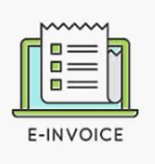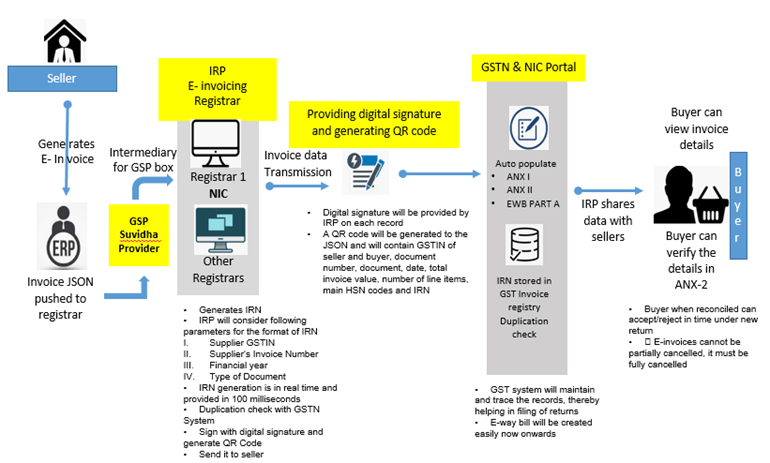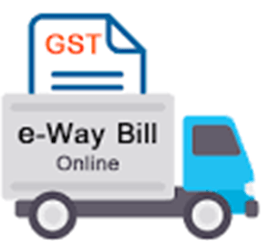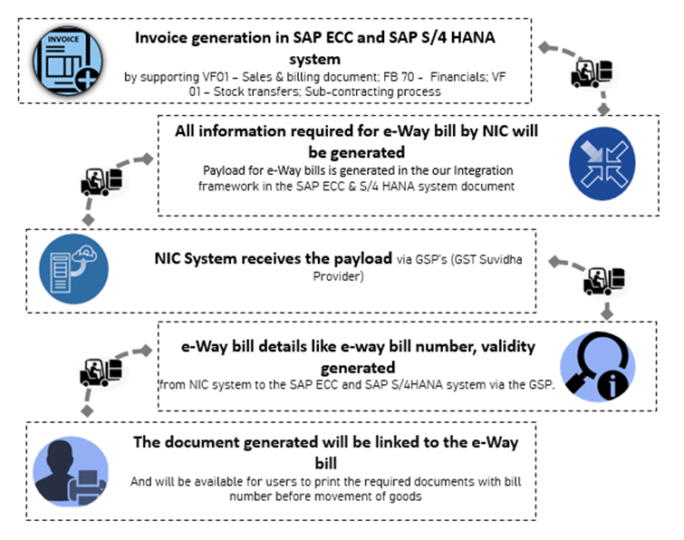E-Invoicing and E-Way bill solution from PEOL
E – Invoicing
Introduction to E-Invoicing
E-invoicing or electronic invoicing’ is a system in which B2B and B2C invoices are authenticated electronically by IRP for further processing in GST and NIC portals.
As per the Indian Government directives, GST E-Invoicing is mandatory from 1st October 2020 for the B2B businesses whose turnover is 100 Crore & above.

Process of E-Invoicing

Solution highlights
- B2B invoices are recorded for once eliminating the need to report the bill in multiple formats and ultimately reducing the chances of errors
- There will be a proper record of overall Sales and Purchase of a business and as a result, the GST returns will automatically be ready for filing under the new GST system
- By using the e-Invoice details, E-way bill can be created.
- There are fewer chances of data reconciliation between the books and filed GST returns
- Real-time invoice entry from the supplier’s side will lead to faster processing of input tax credit on the recipient’s side resulting in faster and accurate credit availability to the recipient
- Auto-loaded information helps the taxpayer in an easy filing with a shorter pile of compliance documents
- Less instance of tax evasion and fraud as the new process asks for real-time data entries
- No possibility of creating fake GST invoice.
E – Way Bill
Introduction to E- Way bill
E Way bill is an electronically generated document which is required for movement of goods of value exceeding Rs. 50,000 (Single Invoice/ bill/ delivery challan) from one location to another either intra state or interstate. This document is generated online on the NIC portal and includes details such as name of the consignor, consignee, and point of origin of consignment, consignment destination and route.
GST regime has mandated the generation of the E Way bill from 1st Apr 2018 and it replaces the Way Bill, which was a physical document and existed during the VAT regime for the movement of goods.
An unique e-Way Bill Number (EBN) is made available to the supplier, recipient and the transporter, when an e-Way bill is generated by a registered tax payer for their outward supply.

Scope of e-Way bill solution with SAP Cloud
The solution will help tax payer to:

Solution Highlights:
- Seamless connect to NIC BY integrating SAP ECC and SAP S/4 HANA system with NIC
- Solution will support any future changes introduced by Government. The solution is capable to scale from technology point of view.
- Hassle free payload creation and tracing and cancellation of e- way possible in real time.
- Inbuilt validations and health check tool made available to ensure all mandatory data required for e-Way bill is part of the payload
For more information, reach us at nidhi.jain@peolsolutions.com





